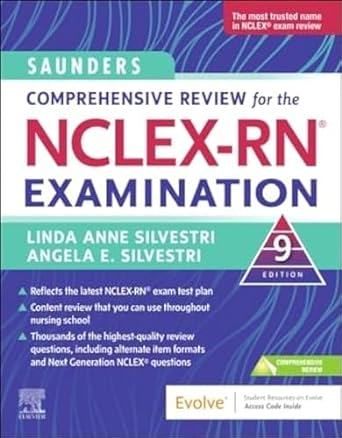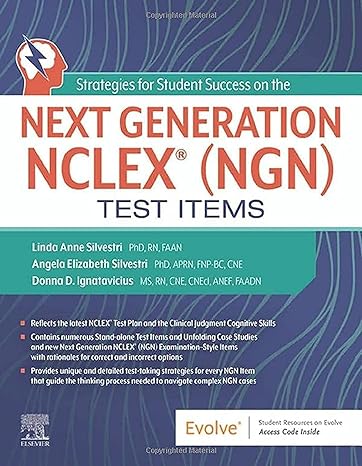Hey nursing graduates, if you are planning to give your NCLEX-RN exam in the upcoming months, then this post is for you. Here, you would be able to know about your NCLEX-RN content, resources and your weakest areas in NCLEX-RN exam.
Begin NCLEX preparation early: REVIEW CONTENT THOROUGHLY (STEP-1)
Following are the PDF in which you will come to know about the thorough content of NCLEX-RN.
2024 NCLEX Candidate Bulletin_English_FINAL.pdf
2024_NCLEXInfo_Flyer_FINAL.pdf
2023_RN_Test Plan_English_FINAL.pdf (ncsbn.org)
Next Generation NCLEX (NGN) | NCLEX
The content of the NCLEX-RN Test Plan is organized into four major Client Needs categories. Two of the
four categories are divided into subcategories.
- Safe and Effective Care Environment
a. Management of Care
b. Safety and Infection Control - Health Promotion and Maintenance
- Psychosocial Integrity
- Physiological Integrity
a. Basic Care and Comfort
b. Pharmacological and Parenteral Therapies
c. Reduction of Risk Potential
d. Physiological Adaptation
Saunders Comprehensive Review for the NCLEX-RN Examination:
Saunders Comprehensive Review for the NCLEX-RN® Examination is hailed as the ultimate guide, featuring 5,700 NCLEX-style questions, including Next Generation NCLEX items. Authored by Linda Anne Silvestri and Angela Elizabeth Silvestri, it provides detailed rationales and test-taking strategies. Trusted by students and acclaimed for its unmatched quality, it’s the top choice for NCLEX preparation.

Strategies for Student Success on the Next Generation NCLEX (NGN) Test Items:
This NCLEX preparation resource, authored by experts Linda Anne Silvestri, Angela E. Silvestri, and Donna D. Ignatavicius, guarantees that you’ll be fully prepared for the NGN exam. For an enriched learning experience, every practice test item comes with an in-depth test-taking strategy and explanations for both right and wrong answers. Case studies allow you to bolster essential cognitive abilities, and extra questions can be accessed on the Evolve website.

(Please note: The provided links are Amazon affiliate links. However, I genuinely endorse these books based on their positive reviews and my personal experience using them during my studies)
Allocate approximately 70% of your study time to focus on your weaker areas, while dedicating the remaining 30% to reviewing your stronger subjects.
Regularly practice NCLEX questions: (STEP – 2)
- Use different sources for questions, like our free NCLEX practice quizzes and your main study materials.
- Practice different question types, such as drag-and-drop and select-all-that-apply.
- Review both right and wrong answers after each session to understand them better.
- Practice a reasonable number of questions daily, focusing on quality rather than quantity for better learning.
Prioritize Your Weak Areas based on your critical thinking: (STEP-3)
Absolutely, maintaining a balance is key. Prioritize your weak areas for improvement, but don’t forget to periodically revisit your strengths to keep them sharp. Here’s a list to help you stay organized:
- Identify weak areas
- Prioritize weak areas for improvement
- Allocate more time and resources to weak areas
- Implement focused practice or learning strategies for each weak area
- Schedule regular review sessions for both weak and strong areas
- Monitor progress and adjust your strategy as needed..
- Celebrate achievements and milestones along the way
- Continuously seek feedback and adapt accordingly.
How to Review NCLEX Questions
- A client is being prepared for a thoracentesis. The nurse should assist the client to which position for the procedure?
- Lying in bed on the affected side
- Lying in bed on the unaffected side
- Sim’s position with the head of the bed flat
- Prone with the head turned to the side and supported by a pillow
ANSWER to this above question is 2.
Suppose if you are not sure which answer option is right. In that case, what you need to do is First of all understand what thoracentesis is. Then, FOCUS on the SUBJECT, positioning for thoracentesis. To perform safely, the site must be visible to PHCP performing the procedure. Lying on the affected side would prevent access to the site. A prone position would not give the PHCP access to the client. Sometimes we need to use our cognitive ability.
BEST PRACTICE NCLEX QUESTION BASED ON POSITIONING CLIENTS Part -8 – brandednurses
NCLEX PRACTICE QUESTIONS BASED ON PROVISION OF A SAFE ENVIRONMENT Part-6 – brandednurses
Use Other Study Methods When You Get Fatigued
- Diversify study methods: Don’t rely solely on NCLEX questions.
- Recognize fatigue or memorization: Change tactics when needed.
- Incorporate videos: Utilize YouTube or other resources for visual and auditory learning like MARK KLIMEX notes, Simple nursing, and so on.
- Leverage textbooks and notes: Revisit summaries and notes to reinforce understanding.
- Benefit of videos: Visual and auditory reinforcement aids understanding.
- Utilize available resources: Take advantage of online lectures covering key NCLEX concepts.
Final NCLEX Test-Taking Tips
Of course, here’s a structured approach to dealing with NCLEX-related stress:
- Acknowledge common worries about failing NCLEX.
- Cast negative thoughts aside and focus on studying.
- Remember that failing NCLEX isn’t uncommon and doesn’t define your capabilities.
- Stay positive and resilient in your preparation.
- If you do fail, sign up for the next available test date without hesitation.
- Take inspiration from successful nurses who also faced initial setbacks.
- Acknowledge the stress but maintain confidence in your abilities.
- Reflect on your journey through nursing school and your accomplishments.
- Trust in your preparation and believe in your capability to succeed.
- Approach the test center with confidence, knowing you’ve done your best.
Identifying weaker areas in NCLEX-RN preparation involves self-assessment and targeted analysis. Here’s a step-by-step approach:
- Take Practice Tests: Start by taking full-length practice tests or quizzes. This helps gauge your overall performance and areas where you struggle the most.
- Review Results: Analyze your practice test results. Look for patterns in the types of questions you answered incorrectly or struggled with.
- Use NCLEX Content Outline: Refer to the official NCLEX-RN Test Plan provided by the National Council of State Boards of Nursing (NCSBN). It outlines the content areas covered on the exam, helping you identify specific topics to focus on.
- Self-Assessment Tools: Some NCLEX review books or online platforms offer self-assessment tools or diagnostic tests. Utilize these to pinpoint weaker areas.
- Reflect on Education and Experience: Consider your nursing education and clinical experience. Reflect on topics or skills that were challenging during your studies or practice.
- Seek Feedback: If possible, discuss your performance with nurse educators, mentors, or peers. They may provide insights or observations that can help identify weaker areas.
- Utilize Study Guides: Review study guides or textbooks that outline key nursing concepts. Pay attention to topics that you find difficult or less familiar.
- Track Progress: Keep track of your performance over time. Monitor improvements in weaker areas as you continue studying and practicing.
By systematically assessing your performance and focusing on areas that need improvement, you can effectively target your NCLEX-RN preparation efforts.
Next Generation NCLEX (NGN) FAQs
- Where can I find the NCLEX-RN syllabus?
2023_RN_Test Plan_English_FINAL.pdf (nclex.com)
2. May I get a refund of my NCLEX-RN fees?
ANS 2: No
3. Is there a separate NCLEX-RN for Canadians and Australians?
ANS 3: The same NCLEX-RN exam is used for Canadian and U.S. entry to nursing practice. For questions about whether you can practice in another state/province/territory, please contact the nursing regulatory body for that jurisdiction. Links to all nursing regulatory bodies’ websites and contact information are available on the NCSBN website.

